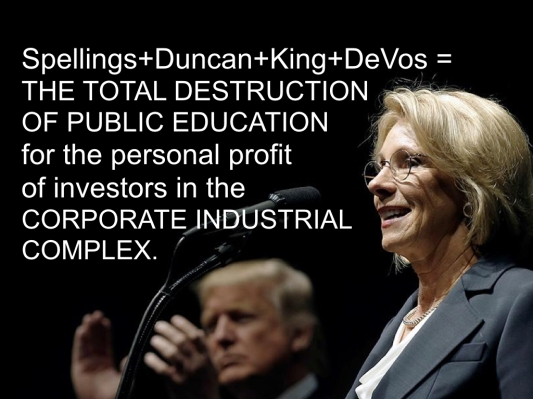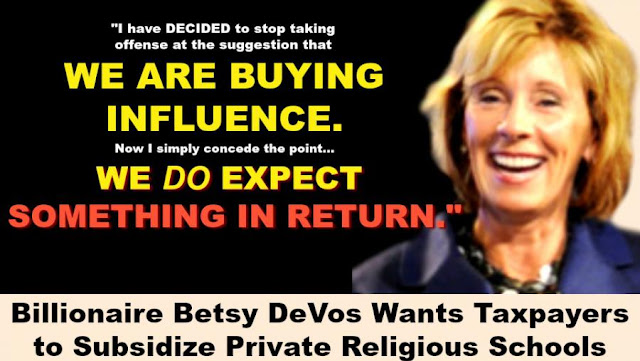Press Releases | Press | Chairman's Newsroom | Chairman | The U.S. Senate Committee on Health, Education, Labor & Pensions:
Alexander: Senate Poised to Confirm Betsy DeVos and “Swap a National School Board for a Local School Board”
Following Senate vote to advance nomination, highlights DeVos supporters, including 22 governors and 4 United States Education Secretaries
WASHINGTON, February 3, 2017 – Senate education committee Chairman Lamar Alexander (R-Tenn.) said the Senate was poised to confirm Betsy DeVos on Tuesday, “swapping a national school board for a local school board,” after the Senate today voted to end debate on her nomination and move to a vote.
“She believes what 85 of us voted for in the law that President Obama called a ‘Christmas Miracle’ in December, 2015—and that is to reverse the trend from a national school board and restore control of our children and our schools to those closest to the children,” Alexander said. “There will be no mandates for Common Core, no mandates for teacher evaluation, no mandates for vouchers from the United States Department of Education headed by Betsy DeVos. We'll be swapping a national school board for what she believes in, which is a local school board—which is what 85 of us voted for.”
“Over the last 30 years as this country has worked to try to improve our public schools, much of that energy has come from outside the public school establishment,” Alexander said. “In the mid-1980s, all of the governors met together in 1985 and 1986 on one subject for a whole year: the purpose was how can we help improve our public schools? … Since that time, many governors, many business leaders have worked hard in support of our public schools, trying to help them become even better opportunities for our children, and among those has been Betsy DeVos.”
He continued, “There are 22 governors who have written letters to me, as chairman of the Senate's education committee, supporting Betsy DeVos. They see her as someone from outside the system of public education who, as they worked for 30 years, can help change and improve it. …Four of the education secretaries support Betsy DeVos: Bill Bennett, Rod Paige, Margaret Spellings—I support her.”
“Now, some have said she has spent her time working on giving children choices of schools other than public schools. She’s done that. And it's always puzzled me as to why anybody would criticize that. The idea that a low-income child should have the same opportunity or more of the same opportunities that a wealthy family has would seem to me to be a very all-American idea. And not only does it seem to be, it's an idea that underlies the most successful piece of social policy our country has ever enacted, arguably: The G.I. Bill for Veterans in 1944. Think about that. The veterans came home from World War II. We gave them a scholarship. It followed them to the college of their choice.
“Mrs. DeVos has argued for the same thing for children. Why is an idea that’s helped to create the Greatest Generation and the greatest colleges in the world so dangerous for schools? … [S]he has been among the forefront of the leaders like the governors for the most successful reform over the last 30 years to change and improve public education, and that would be the public charter schools. Those began with 12 schools in Minnesota, created by the Democratic Farmer Labor Party in the early 1990’s. Since then, charter schools have been supported by every president: President Obama, President Clinton, Presidents Bush, President Obama's most recent Education Secretary was a founder of charter schools.
“This Congress four times, by bipartisan majorities has supported charter schools. The last six United States Education Secretaries have supported charter schools. Charter schools have grown from 12 Democratic Farmer Labor schools to 6,800 today and 2.9 million children go there. Teachers have more freedom and parents have more choices. They are public schools, and Betsy DeVos is on the forefront of helping to create that opportunity for public education.”
Alexander’s full remarks given on the Senate floor today are below:
With this vote, the Senate will move early next week to confirm the nomination of Betsy DeVos to be the United Stated Education Secretary. She’ll be an excellent Education Secretary, in my judgment, and an important one for this country. The number one job of the United States Education Secretary is to help create an environment in which our 100,000 public schools succeed because that’s where nine out of ten of our children go. When I was Education Secretary in the early 1990s for President George H. W. Bush, I had the privilege of working with a man named David Kearns, who had been the Chief Executive Officer of the Xerox Corporation.
He came in as a deputy education secretary at time when he was not the only one of the country’s leading businessmen, but he was also a leading businessman who tried to help change public education. And David Kearns’ belief was that it’s very difficult to help children by changing public education if you try to do it from within. He respected, as all of us do, the teachers and the parents and the students who work within the public education system. But, over the last 30 years as this country has worked to try to improve our public schools, much of that energy has come from outside the public school establishment. Among those were the governors of the country. In the mid-1980s, all of the governors met together in 1985 and 1986 on one subject for a whole year: the purpose was how can we help improve our public schools?
I was chairman of the governors that year. Bill Clinton was the vice chairman. We did that in a bipartisan way. We did that from outside the schools. Since that time, many governors, many business leaders have worked hard in support of our public schools, trying to help them become even better opportunities for our children, and among those has been Betsy DeVos.
The governors that I spoke of are governors that are familiar names in this country. I think of Governor Jeb Bush. I think of Governor John Engler of Michigan. I think of Governor Mitt Romney and the work they did in their respective states to make their public schools better and to create other opportunities for children. All of those governors—the three I mentioned—Bush, Romney, Engler, they support Betsy DeVos. There are 22 governors who have written letters to me, as chairman of the Senate's education committee, supporting Betsy DeVos. They see her as someone from outside the system of public education who, as they worked for 30 years, can help change and improve it. I ask consent to include in the record following my remarks the names of the 22 governors who support her. They come from Alabama, Arizona, Arkansas, Florida, Illinois, Indiana, Kansas, Kentucky, Maine, Michigan, Mississippi, Missouri, North Dakota, Nebraska, Nevada, New Jersey, New Mexico, Ohio, Oklahoma, Tennessee, Texas, [and] Wisconsin. The governors of all those states support Betsy DeVos.
Four of the education secretaries support Betsy DeVos: Bill Bennett, Rod Paige, Margaret Spellings—I support her. Joe Lieberman, who served in this body and worked on the D.C. Voucher program for many years, endorsed her. So, she has strong support from the governors, who for 30 years have been working hard to successfully improve our public schools.
Now, some have said she has spent her time working on giving children choices of schools other than public schools. She’s done that. And it's always puzzled me as to why anybody would criticize that. The idea that a low-income child should have the same opportunity or more of the same opportunities that a wealthy family has would seem to me to be a very all-American idea. And not only does it seem to be, it's an idea that underlies the most successful piece of social policy our country has ever enacted, arguably: The G.I. Bill for Veterans in 1944. Think about that. The veterans came home from World War II. We gave them a scholarship. It followed them to the college of their choice. Mrs. DeVos has argued for the same thing for children. Why is an idea that’s helped to create the Greatest Generation and the greatest colleges in the world so dangerous for schools?
But I would argue that she has been among the forefront of the leaders like the governors for the most successful reform over the last 30 years to change and improve public education, and that would be the public charter schools. Those began with 12 schools in Minnesota, created by the Democratic Farmer Labor Party in the early 1990’s. Since then, charter schools have been supported by every president: President Obama, President Clinton, Presidents Bush, President Obama's most recent Education Secretary was a founder of charter schools.
This Congress four times, by bipartisan majorities has supported charter schools. The last six United States Education Secretaries have supported charter schools. Charter schools have grown from 12 Democratic Farmer Labor schools to 6,800 today and 2.9 million children go there. Teachers have more freedom and parents have more choices. They are public schools, and Betsy DeVos is on the forefront of helping to create that opportunity for public education.
And finally, Madam President, she believes what 85 of us voted for in the law that President Obama called a ‘Christmas Miracle’ in December, 2015. And that is to reverse the trend from a national school board and restore control of our children and our schools to those closest to the children. There will be no mandates for Common Core, no mandates for teacher evaluation, no mandates for vouchers from the United States Department of Education headed by Betsy DeVos. We'll be swapping a national school board for what she believes in, which is a local school board—which is what 85 of us voted for. I'm pleased to support her. Following my record, I ask consent [to include] an article from Max Eden, published a couple of days ago, which shows that Detroit charter schools by three major studies are better and the children perform better than the traditional schools in Detroit, and I look forward to casting my vote for Betsy DeVos for U.S. Education Secretary early next week.
Press Releases | Press | Chairman's Newsroom | Chairman | The U.S. Senate Committee on Health, Education, Labor & Pensions:























